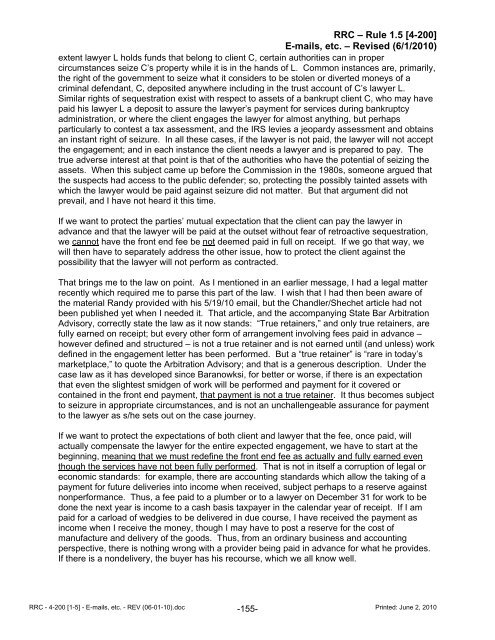Sorted by Commenter - Ethics - State of California
Sorted by Commenter - Ethics - State of California
Sorted by Commenter - Ethics - State of California
Create successful ePaper yourself
Turn your PDF publications into a flip-book with our unique Google optimized e-Paper software.
RRC – Rule 1.5 [4-200]<br />
E-mails, etc. – Revised (6/1/2010)<br />
extent lawyer L holds funds that belong to client C, certain authorities can in proper<br />
circumstances seize C’s property while it is in the hands <strong>of</strong> L. Common instances are, primarily,<br />
the right <strong>of</strong> the government to seize what it considers to be stolen or diverted moneys <strong>of</strong> a<br />
criminal defendant, C, deposited anywhere including in the trust account <strong>of</strong> C’s lawyer L.<br />
Similar rights <strong>of</strong> sequestration exist with respect to assets <strong>of</strong> a bankrupt client C, who may have<br />
paid his lawyer L a deposit to assure the lawyer’s payment for services during bankruptcy<br />
administration, or where the client engages the lawyer for almost anything, but perhaps<br />
particularly to contest a tax assessment, and the IRS levies a jeopardy assessment and obtains<br />
an instant right <strong>of</strong> seizure. In all these cases, if the lawyer is not paid, the lawyer will not accept<br />
the engagement; and in each instance the client needs a lawyer and is prepared to pay. The<br />
true adverse interest at that point is that <strong>of</strong> the authorities who have the potential <strong>of</strong> seizing the<br />
assets. When this subject came up before the Commission in the 1980s, someone argued that<br />
the suspects had access to the public defender; so, protecting the possibly tainted assets with<br />
which the lawyer would be paid against seizure did not matter. But that argument did not<br />
prevail, and I have not heard it this time.<br />
If we want to protect the parties’ mutual expectation that the client can pay the lawyer in<br />
advance and that the lawyer will be paid at the outset without fear <strong>of</strong> retroactive sequestration,<br />
we cannot have the front end fee be not deemed paid in full on receipt. If we go that way, we<br />
will then have to separately address the other issue, how to protect the client against the<br />
possibility that the lawyer will not perform as contracted.<br />
That brings me to the law on point. As I mentioned in an earlier message, I had a legal matter<br />
recently which required me to parse this part <strong>of</strong> the law. I wish that I had then been aware <strong>of</strong><br />
the material Randy provided with his 5/19/10 email, but the Chandler/Shechet article had not<br />
been published yet when I needed it. That article, and the accompanying <strong>State</strong> Bar Arbitration<br />
Advisory, correctly state the law as it now stands: “True retainers,” and only true retainers, are<br />
fully earned on receipt; but every other form <strong>of</strong> arrangement involving fees paid in advance –<br />
however defined and structured – is not a true retainer and is not earned until (and unless) work<br />
defined in the engagement letter has been performed. But a “true retainer” is “rare in today’s<br />
marketplace,” to quote the Arbitration Advisory; and that is a generous description. Under the<br />
case law as it has developed since Baranowksi, for better or worse, if there is an expectation<br />
that even the slightest smidgen <strong>of</strong> work will be performed and payment for it covered or<br />
contained in the front end payment, that payment is not a true retainer. It thus becomes subject<br />
to seizure in appropriate circumstances, and is not an unchallengeable assurance for payment<br />
to the lawyer as s/he sets out on the case journey.<br />
If we want to protect the expectations <strong>of</strong> both client and lawyer that the fee, once paid, will<br />
actually compensate the lawyer for the entire expected engagement, we have to start at the<br />
beginning, meaning that we must redefine the front end fee as actually and fully earned even<br />
though the services have not been fully performed. That is not in itself a corruption <strong>of</strong> legal or<br />
economic standards: for example, there are accounting standards which allow the taking <strong>of</strong> a<br />
payment for future deliveries into income when received, subject perhaps to a reserve against<br />
nonperformance. Thus, a fee paid to a plumber or to a lawyer on December 31 for work to be<br />
done the next year is income to a cash basis taxpayer in the calendar year <strong>of</strong> receipt. If I am<br />
paid for a carload <strong>of</strong> wedgies to be delivered in due course, I have received the payment as<br />
income when I receive the money, though I may have to post a reserve for the cost <strong>of</strong><br />
manufacture and delivery <strong>of</strong> the goods. Thus, from an ordinary business and accounting<br />
perspective, there is nothing wrong with a provider being paid in advance for what he provides.<br />
If there is a nondelivery, the buyer has his recourse, which we all know well.<br />
RRC - 4-200 [1-5] - E-mails, etc. - REV (06-01-10).doc -155-<br />
Printed: June 2, 2010












![Proposed Rule 4.1 [N/A] “Truthfulness in Statements to Others” - Ethics](https://img.yumpu.com/19037854/1/190x245/proposed-rule-41-n-a-truthfulness-in-statements-to-others-ethics.jpg?quality=85)



